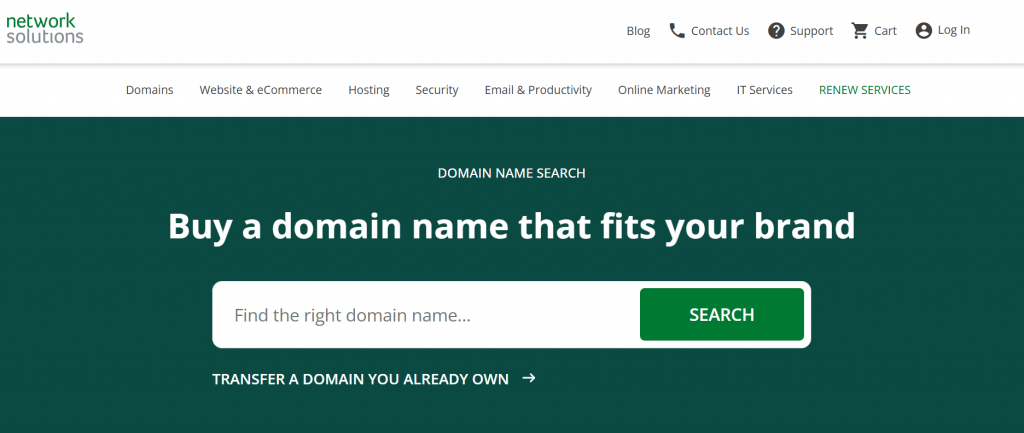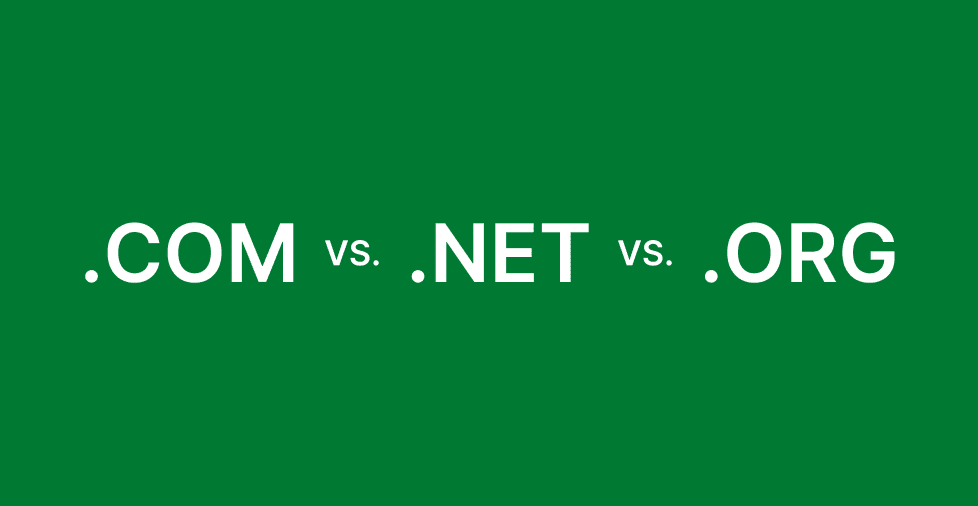Key takeaways:
- .com is best for businesses and general websites—it’s the most trusted and recognized.
- .net works well for tech companies, networking projects, or as a backup if .com is taken.
- .org is ideal for nonprofits, charities, and community-focused groups wanting to build trust.
Think of your domain extension as the sign above your shop’s door. It instantly tells people who you are and what to expect inside. Whether you’re launching a startup, building a nonprofit, or creating a personal blog, that tiny ending—.com, .net, or .org —can make a big impact.
In this guide, we’ll break down the real differences between these top-level domains (TLDs), when to use each one, and how to pick the best fit for your goals. Plus, we’ll answer some common questions and share expert tips to help you make a smart choice from the start.
Quick comparison: .com vs .net vs .org
Deciding on the right domain extension is an important step for your online presence. This quick comparison table provides a side-by-side look at the most popular TLDs: .com, .net, and .org.
We’ve highlighted their ideal use cases, perceived trust, availability, and impact on SEO to help you make an informed decision.
| .com | .org | .net | |
| Meaning | Commercial | Organization | Network |
| Intended Use | Businesses, personal blogs, general websites | Non-profits, charities, open-source projects, communities | Tech services like ISPs, hosting, online communities |
| Popularity | Most popular globally | Popular with non-profits and communities | Recognized but less common, often a strong fallback |
| Trust Factor | High — widely seen as credible and trusted | High — associated with transparency and community efforts | Moderate — strong fit for tech industries, generally trustworthy |
| Availability | Highly competitive (many names are taken) | Easier to find than .com | Easier to find than .com |
| SEO Impact | No technical SEO advantage, but strong branding value; often the default for users | No direct impact, highly trusted for non-profits and education; can build niche authority | No direct impact, solid for tech brands; good for distinct branding within its niche |
| Cost on Network Solutions (Approx. First Year) | Ranges from $11.99 – $25.00/yr (often with higher renewal) | anges from $20.00 – $25.00/yr (often with higher renewal) | anges from $20.00 – $25.00/yr (often with higher renewal) |
| Best For | Businesses, eCommerce, personal blogs, broad appeal | Non-profits, advocacy groups, educational projects, communities | Tech companies, startups, hosting services, online services, network-related ventures |
What is .com?
The .com domain is by far the most recognized and widely used top-level domain on the internet, with 44.4% global website usage, making it the most trusted and recognized TLD on the internet.
Originally intended for commercial entities, its universal appeal now makes it suitable for almost any type of website. Understanding its core characteristics, advantages, and disadvantages can help you take advantage of its immense popularity.
- What it means: Short for “commercial”
- Who uses it: Anyone, from small businesses to personal blogs
- Pros: Most familiar, trustworthy, and easy to remember
- Cons: Popular .com names are often already registered
- Example: www.yourbrand.com
What is .net?
The .net domain, short for “network,” was initially created for organizations involved in networking technologies. While not as universally recognized as .com, it still serves as a reliable alternative, particularly for tech-centric businesses or online communities. This is supported with nearly 13 million .net registrations worldwide.
Exploring its specific meaning, common users, and a balanced view of its pros and cons can help determine if it’s the right fit for your site.
- What it means: Short for “network”
- Who uses it: Tech companies, service providers, online communities
- Pros: Reliable alternative to .com; clear for tech-focused brands
- Cons: Not as common—many visitors assume your site ends in .com
- Example: www.yourbrand.net
What is .org?
The .org domain, short for “organization,” carries a strong association with non-profit entities and community-driven initiatives. It signals a mission-focused purpose and can significantly boost credibility for such endeavors.
Delving into its meaning, typical users, and the distinct advantages and potential drawbacks will clarify its suitability for your organizational goals. Today, around 11 million .org domains are in use worldwide.
- What it means: Short for “organization”
- Who uses it: Nonprofits, charities, educational projects, communities
- Pros: Builds trust and credibility for mission-driven work
- Cons: Not restricted—for-profits can use .org, which may confuse visitors
- Example: www.yourcause.org
What’s the difference between .com, .org, and .net?
Your website’s domain extension is a vital element of your online identity. While .com, .net, and .org are three of the most established and widely recognized TLDs, they each carry distinct connotations that can significantly influence your brand’s perception, credibility, and even user behavior. A strategic choice requires a nuanced understanding of their core differences in intended use, public trust, availability, SEO considerations, and overall brand implications.
Here’s a breakdown of how .com, .net, and .org differ:
Intended use
Originally, the primary TLDs were created with specific purposes in mind, a legacy that continues to shape their perception today:
- .com: The undisputed heavyweight, .com was intended for commercial entities. It has since evolved to become the default and most versatile TLD, suitable for nearly any type of website, including businesses, blogs, portfolios, and e-commerce stores. Its ubiquity has made it synonymous with the internet itself.
- .net: Derived from “network,” this extension was initially aimed at organizations involved in internet infrastructure, technology, and networking services. While its use has broadened, it still retains a strong association with tech-centric businesses, software companies, and online service providers.
- .org: Short for “organization,” this TLD was designated for non-profit and non-commercial entities. It’s the go-to choice for charities, foundations, community groups, educational institutions, and open-source projects, instantly signaling a mission-driven purpose.
Public trust and perception
The extension you choose can have a direct impact on how trustworthy your website appears to visitors. Here’s how each domain extension influences public trust:
- .com: As the long-standing default, .com domains inherently carry a high level of trust and familiarity. Users are conditioned to type .com by default, making it the most memorable and often perceived as the most professional and established option.
- .org: For non-profit and cause-based organizations, the .org extension is a powerful trust signal. It immediately communicates a non-commercial intent, which can be highly effective in building credibility and encouraging support for a cause. For a for-profit business, however, using a .org can be confusing and may mislead visitors.
- .net: The trust level of a .net domain is generally considered strong, particularly within the technology sector. However, for non-tech businesses, it can sometimes be perceived as a less-desirable alternative to a .com, potentially raising questions about why the .com was not secured.
Availability
The immense popularity of the .com TLD has a significant drawback: scarcity. Here’s how availability compares across the three extensions:
- .com: Finding a short, memorable, and brandable .com domain can be a significant challenge. The most desirable names are often already taken, leading to a thriving aftermarket where premium domains can command high prices.
- .net and .org: If your desired .com domain is unavailable, .net and .org often present more readily available options. This can be a practical advantage, allowing you to secure a domain that closely aligns with your brand name without having to resort to long or convoluted alternatives.
Search engine rankings
A common misconception is that the choice of TLD directly impacts search engine rankings. However, the reality is more straightforward:
Google and other major search engines treat .com, .net, and .org equally in terms of their direct effect on SEO. Your website’s ranking is determined by a multitude of other factors, including the quality of your content, site structure, backlinks, and user experience.
While the TLD itself is not a direct ranking factor, it can have an indirect influence. A more trusted and memorable TLD like .com might lead to a higher click-through rate from search results, which is a positive signal to search engines.
Visitor perception and brand identity
Ultimately, your domain extension is an important component of your brand’s story. The wrong choice can create confusion and dilute your message. Here’s how each extension can shape how your brand is perceived:
- A .com provides a versatile and universally understood foundation for a commercial
- A .net can effectively position a brand as modern, tech-focused, and innovative. brand.
- An .org clearly communicates a commitment to a cause or community, fostering a sense of purpose and trust.
Choosing the wrong TLD can lead to a disconnect between your brand’s identity and your online presence. For instance, an eCommerce store using a .org might confuse visitors about its commercial nature, while a community forum with a .com might not immediately convey its collaborative purpose. A thoughtful selection that aligns with your website’s core mission is paramount for building a strong and credible online brand.
Which domain extension should you choose?
Selecting the ideal domain extension is a pivotal decision that impacts your brand’s identity and online reach. This section provides a straightforward guide to help you navigate the choice between .com, .net, and .org, so your domain aligns perfectly with your website’s purpose and target audience.
Use this quick guide:
Choose .com if:
- You run a business, blog, or general-purpose site
- You want strong name recognition
Choose .net if:
- You’re in tech or networking
- You want a professional fallback if .com isn’t available
Choose .org if:
- You’re a nonprofit, community project, or charity
- You want to emphasize trust and mission over profit
Why choosing the right domain extension is key to your brand’s success
Your domain extension, that little suffix at the end of your web address like .com, .net, or .org, might seem like a minor detail, but it plays a huge role in how your brand is perceived online. That little extension at the end of your URL does a lot of heavy lifting. It’s the very first clue people get about who you are and what you stand for.
Choosing the right extension helps you build immediate trust and credibility. A well-chosen TLD instantly communicates your purpose, whether you’re a trustworthy business, a tech innovator, or a dedicated non-profit. The wrong one, however, can cause confusion, dilute your brand’s message, or even make your site seem less professional.
Think of it as the digital equivalent of a sign on your storefront. You want it to clearly and confidently tell people what to expect inside. Selecting wisely ensures your online identity supports your brand’s mission from the very first click.
Should you buy all three?
Acquiring multiple domain extensions for your brand, specifically .com, .net, and .org, can be a strategic move to safeguard your online presence. While not always necessary, owning all three can offer significant benefits in terms of brand protection and outreach. Many businesses opt to secure multiple TLDs for several compelling reasons.
If you can, owning .com, .net, and .org protects your brand. Many businesses secure multiple TLDs to:
- Avoid copycats
- Catch typos or misdirected visitors
- Strengthen brand authority
Key tips for choosing the right domain extension
Not sure which domain extension to go with? These tips can help you make the right choice for your business or organization:
- Build credibility with .com. The .com extension is widely recognized and trusted. It’s often seen as the professional default, which can help build credibility and trust with your audience.
- Align your extension with your purpose. Use a domain extension that reflects your mission. Businesses typically prefer .com, while nonprofits and community organizations often choose .org. Tech-focused brands might lean toward .net.
- Have a backup plan. If your ideal .com is already taken, don’t panic. Consider alternatives like .net, .org, or even newer extensions such as .info, .co, or niche-specific TLDs that fit your brand.
- Think local if it makes sense. If you’re targeting customers in a specific country, a country-code TLD like .us, .uk, or .ca can signal local relevance and help build regional trust.
- Keep it short and easy to remember. A concise, easy-to-type domain is more user-friendly. Avoid overly long or complex names that are hard to remember or prone to typos.
- Choose with growth in mind. If you expect your brand to grow or evolve commercially, a .com can be a strong long-term choice that scales with your business.
How to register a .com, .net, and .org domain extensions with Network Solutions
Securing your ideal domain name is a straightforward process, especially with a reputable registrar like Network Solutions. Whether you’re aiming for the globally recognized .com or the trusted .org for your mission-driven site, the steps are designed to be user-friendly.
Here’s a general guide on how to register your chosen .com or .org domain extension with Network Solutions:
- Go to the official Network Solutions page.
- Type the domain name you wish to register, and then click SEARCH.

3. If your desired domain name is not available, it will suggest an alternative domain name. Click ADD TO CART before clicking CONTINUE. Otherwise if it’s available, it will automatically be added to your shopping cart. Click CONTINUE.

- Select a domain package. Network Solutions offers three domain packages: Domain Only, Domain and Essential Hosting, and Domain Premium Hosting.
- Select any tools you’d like to include with your domain, then click CONTINUE TO CART.

6. Review all your details, including the final domain price and the tools you’ve selected. If everything is correct, click CONTINUE TO CHECKOUT.
- Enter your billing and contact information, and then click SUBMIT PAYMENT.
By following these steps on Network Solutions, you can efficiently secure the .com or .org domain that best represents your brand or organization, setting the foundation for your online presence.
Your next step to the perfect domain
Your domain extension is key to your brand’s online identity and how people see your website. Picking the right one helps you build trust, appear professional, and reach your target audience.
While each has its benefits, .com is generally the safest and most recognized choice. However, consider .net for tech-focused projects or .org for non-profits if they better fit your mission. The best domain reflects your brand, is memorable, and serves your long-term goals.
Search for your perfect domain name now with Network Solutions and take the first step toward establishing your online presence!
Frequently asked questions
.com is for businesses and general use, .net is for tech and networking, and .org is mainly for nonprofits and communities.
No. Google doesn’t favor one extension over another. Content, backlinks, and site quality matter more.
Yes, but it may confuse visitors who expect .org to signal a nonprofit mission.
Try .com variations, check if .net or .org are available, or consider buying the .com from its current owner.




